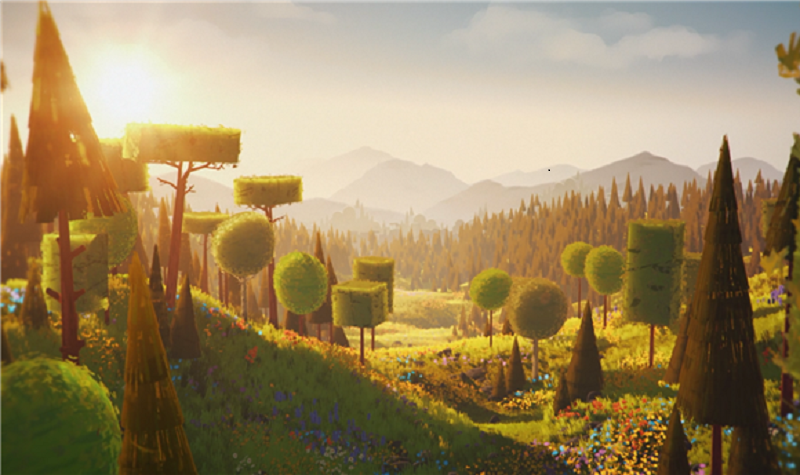Award-winning animation studio E.D. Films recently announced its next short film Three Trees which is built and directed in real time, entirely within Unreal Engine. Utilising the aesthetics of a children’s book and starring the vocal talents of EGOT winner Whoopi Goldberg, the short will officially debut at the Palm Springs International ShortFest on 24 June, where it will compete for Oscar eligibility.
Three Trees is written by Emmy-nominated television and film director M.R. Horhager and illustrated by veteran art director Aaron Hong. It is the story of three friends who each happen to be a distinct species of tree. As they grow and change over the course of a full year, each of the trees experiences the new seasons in their own unique way, which initially sets them apart. With the help of their friends, the trio come to embrace the differences that make them who they are.
To deliver their message of acceptance, Horhager and Hong envisioned a short film with a children’s book-like aesthetic, featuring a forest filled with trees of multiple colours and geometric shapes. But to bring it to life as an animated short, they wanted to utilise filmmaking techniques that have traditionally been the province of live-action projects, including elements like final framing and cinematography.
To have that freedom to experiment, the duo needed to be able to explore a complete digital environment from any angle, in real time. That meant using a game engine, which led the duo to E.D. Films, experts in adapting distinct animation properties and one of the first animation studios in the world to have received an Epic MegaGrant.
“We’ve been working with game engines for over a decade now, but recently Epic has made some incredible additions to Unreal Engine that have allowed us to streamline how we approach many of our animation projects,” said E.D. Films co-founder and lead producer Emily Paige. “Having access to Epic’s support team and the community of filmmakers working with Unreal has been incredible. With their help, our work on Three Trees really showed off what real-time animation production is capable of.”
E.D. Films began by adapting Hong’s 2D illustrations into a vibrant 3D environment. Using Unreal’s procedural tools, including the internal foliage and terrain options, artists were able to quickly create a complete forest that helped capture the unique storybook-inspired feel.
Material creation and instancing systems were then employed to build textures and surfaces like tree bark and undergrowth, along with the distinctive leaves of each tree. The team was then able to leverage Unreal’s season-switching system to transition the forest from fully green in the summer to the colours of autumn, then to a layer of winter snow before showing flowers bloom under spring conditions.
With the stage set, Horhager and Hong were able to jump into the scene and move through it in real time. With traditional animation, every moment needs to be intricately planned and determined in advance, but by using Unreal Engine, E.D. Films were able to give the directors the freedom to take control of the camera. From there, the duo were able to experiment and determine the best angles, movement and positioning for each shot. Once the short film’s look was established, it was then rendered within the game engine and ready for Goldberg’s narration.
Following the completion of the Three Trees short film, Horhager and Hong began discussions with E.D. Films on potentially using the assets and completed materials to bring the story to additional platforms, starting with a traditional children’s book. Additional adaptations including a planetarium dome output are also being discussed, with details on future releases coming later.
Three Trees marks the latest step in E.D. Films’ ongoing experimentation with using game engines to produce professional-quality animation. Since 2014, it has been one of the leaders in creating new pipelines and original tools within Unreal Engine, including the industry-first PSD to 3D conversion system that has helped turn a generation of 2D artists into 3D filmmakers.
The studio is coming off the release of its own short film, Return to Hairy Hill, which took advantage of Unreal Engine’s previs and real-time rendering tools, along with several of E.D. Films’ proprietary tools. The film recently won the prestigious Guy L. Coté grand prize for Best Canadian Animated Film at Les Sommets du Cinéma d’Animation 2023.
Three Trees will make its official debut at the Palm Springs International ShortFest, a competition that features some of the best and most inventive short films in the world. Winners will receive awards and prizes worth up to $25,000, and the top shorts will earn eligibility for Oscar, BAFTA, BIFA and Goya Award contention. The Best of Fest shorts will be screened on 26 June.
Inspired by its work on Three Trees, E.D. Films is preparing a new tutorial series designed to help Unreal Engine users learn how to create and customize a wide range of plants and flowers using the aesthetic of a children’s book illustration.
E.D. Films co-founder and director Daniel Gies will outline the process used on Three Trees, highlighting how to make digital paintings of the textures in either Photoshop or Procreate, to then build the flora in SpeedTree before importing everything into the game engine.

